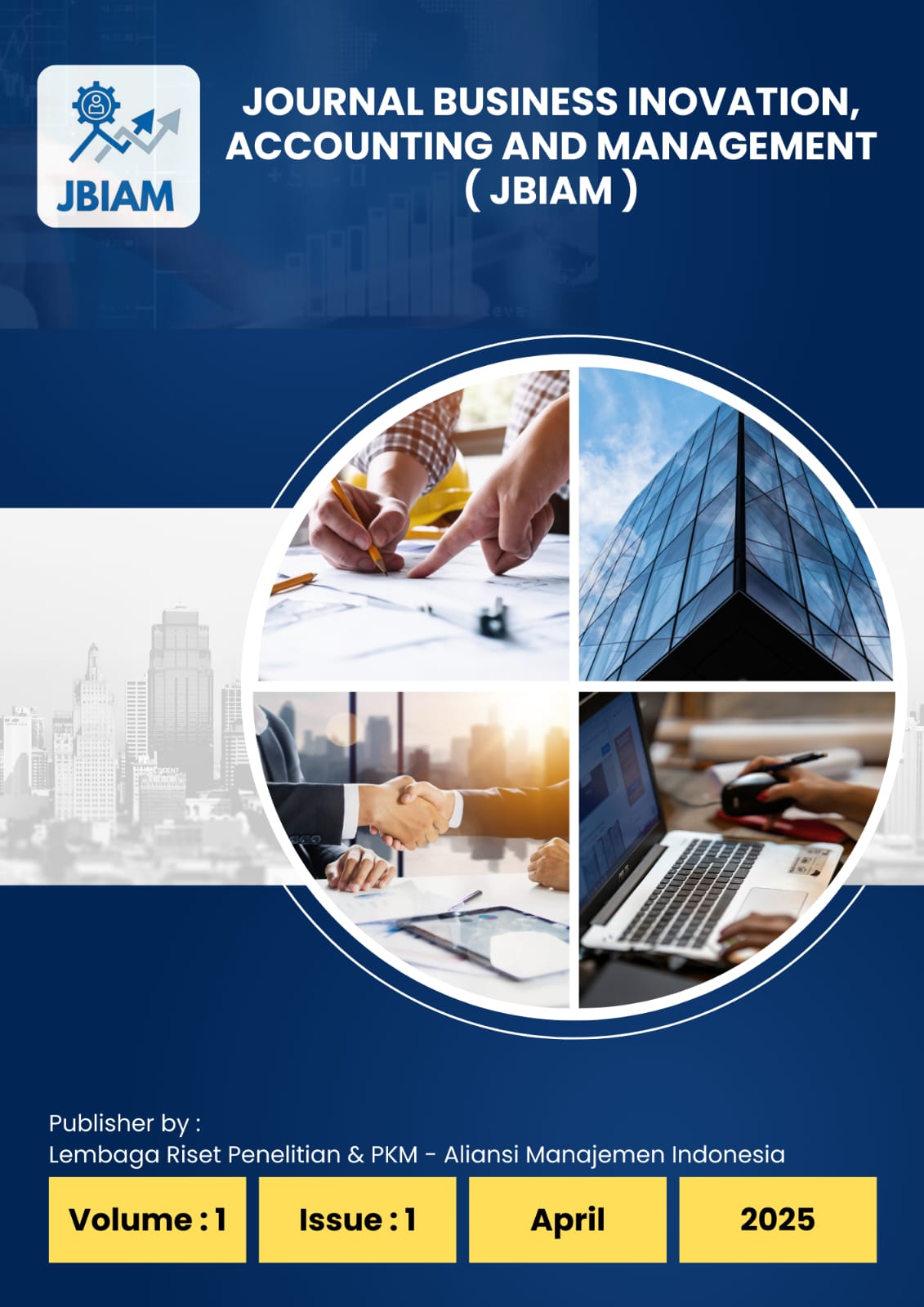Slow Living Financial Behavior: Mindful Consumption, Entrepreneurial Transition, and Sustainable Lifestyles
Main Article Content
Abstract
Explores slow living financial behavior countercultural lifestyle rooted mindfulness, intentional financial planning, resistance to pervasive consumerism. Utilizing a descriptive qualitative approach, data were collected through in-depth interviews, participatory observation, and social media content analysis. An objects who individuals aged 35–40 who exited long-term corporate careers to pursue small, passion-driven enterprises, signaling a second stage behavioral financial life-cycle. Findings reveal professional dissatisfaction, burnout, and misalignment between effort how reward in traditional work environments. Slow living approach promotes a more sustainable meaningful life, requires substantial financial preparation, adaptation which entrepreneurial demands—areas where many practitioners initially lack readiness. Financial wellbeing emerges as a prerequisite lifestyle shifting, ensuring resilience during the transition. Finding highlights importance structural mechanisms cross-subsidization socially motivated investors to sustain micro-enterprises aligned slow living values. Ultimately, sustainable adoption slow living financial behavior depends on the interplay between conscious consumption, economic stability, and systemic support.
Downloads
Article Details
Section

This work is licensed under a Creative Commons Attribution 4.0 International License.
References
Ashta, A. (2014). An introduction to slow money and its Gandhian roots. Journal of Human Values. https://doi.org/10.1177/0971685814539410
Bauer, N., Netto, A. C., & Trigo, L. G. G. (2015). A sociedade do cansaço e a ideologia do desempenho. São Paulo: Editora Cortez.
Brianna, L., Middlewood, A., Chin, H., Johnson, M. A., & Knoll, Z. (2018). Exploring the relationships between impatience, savings automation, and financial welfare. Financial Planning Review. https://doi.org/10.1002/CFP2.1020
Diana-Eugenia, I., & Eva-Cristina, P. (2016). Slow living and the green economy. Journal of Philosophical Economics, IX(2), 6–28.
Finkelstein, M. (2014, November 24). Slow living is healthy living. HuffPost. http://www.huffingtonpost.com/michael-finkelstein-md/slow-living-is-healthy-li_b_6209242.html
Greenberg, J. B., Hamilton, J., Daily, G. C., & Bratman, G. N. (2021). Nature experience reduces rumination and subgenual prefrontal cortex activation. PNAS, 112(28), 8567–8572.
Holden, A. (2000). Environment and tourism. London: Routledge.
Klug, K. (2018). Slow Living: Schluss mit High-Speed (pp. 37–47). Springer Gabler, Wiesbaden. https://doi.org/10.1007/978-3-658-21110-3_5
Linke, C. (2015). Urban planning and the automobile: Environmental and social consequences of car-centric development. Revista Brasileira de Planejamento Urbano e Regional, 7(2), 123–138.
Maharani, A. S., & Putra, I. L. (2024). Analysis of The Influence of System Quality, Information Quality, Service Quality on Net Benefits in The Finance Billing Management System (FBMS). Journal of Applied Accounting and Taxation, 9(2), 216-223.
McIntosh, M. (2018). The speed of life: Modern acceleration and mental health. Journal of Health and Social Behavior, 59(4), 456–470.
Mendrofa, A. D., Bate’e, M. M., Harefa, I., & Zai, K. S. (2024). Pengaruh Gaya Hidup Terhadap Perilaku Keuangan Mahasiswa Fakultas Ekonomi Universitas Nias. Visi Sosial Humaniora, 5(1), 19–30. https://doi.org/10.51622/vsh.v5i1.2310
Meredith, B., & Storm, E. (2009). Slow living - Learning to savor and fully engage with life. Create The Good Life. http://www.create-the-good-life.com. Retrieved March 20, 2011.
Naufal, M. F. B., Nurhasanah, N., & Nurrachmi, I. (2024). Analisis Maqashid Syariah terhadap Perilaku Konsumsi dari Pengguna Gaya Hidup Frugal Living. Bandung Conference Series Sharia Economic Law, 4(2), 422–431. https://doi.org/10.29313/bcssel.v4i2.13610
Oliveira, R., Silva, J., & Costa, T. (2021). Burnout global trends in the 21st century. Journal of Occupational Health, 63(2), 101–110.
Parkins, W. & Craig, G.(2006). Slow living. New York: BERG
Paul, S. (2016). Green economy: A sensible option, but not a miracle. Friedrich Ebert Stiftung. http://www.fes-sustainability.org/de/diskussionen/green-economy-sustainable-concept. Accessed April 2016.
Putra, I. L. (2022). Pengaruh Financial Pressure, Stability dan Target terhadap Financial Statement Fraud. Ristansi: Riset Akuntansi, 3(2), 190-202.
Putra, I. L. (2024). Efek Teknologi Informasi dan Work Life Balance Terhadap Kinerja Karyawan Pada New Normal: Efek Teknologi Informasi dan Work Life Balance Terhadap Kinerja Karyawan Pada New Normal. Advantage: Journal of Management and Business, 2(1), 19-31.
Putra, I. L., Puspitasari, P., & Oktora, Y. S. (2025). Keperilakuan Well-being Investasi Kolektor Jersey Bola Original. Jurnal Akuntansi Publik Nusantara, 3(1), 15-23.
Puspitasari, P., Putra, I. L., Ramadhani, R. P., & Putra, Z. F. (2024). Penggunaan Bahasa Indonesia dalam Dunia Usaha dan Dunia Industri (Dudi) Bidang Jasa. Indonesian Research Journal on Education, 4(4), 1973-1983.
Sari, S. A., & Lukito, Y. N. (2017). Slow living as an Alternative Response to Modern Life. 1. http://proceedings.ui.ac.id/index.php/uipst/article/download/126/170
Shah, K. (2014). Study of behavioural finance with reference to investor behaviour. Social Science Research Network. https://doi.org/10.2139/SSRN.2534318
Thaler, R. H., & Shefrin, H. M. (1981). An economic theory of self-control. Journal of Political Economy, 89(2), 392–406.
Thomaz, D. C., & Prado, G. C. (2023). Slowing down to live with purpose: a systematic review on Slow Living. https://doi.org/10.29183/978-65-00-87779-3.sds2023.p135-146
Thomaz, D., & Prado, G. (2024). Desacelerando com o slow living: uma revisão sistemática. Plural Design, 7(1), 38–48. https://doi.org/10.21726/pl.v7i1.2359
Twenge, J. M., & Campbell, W. K. (2018). Associations between screen time and lower psychological well-being among children and adolescents: Evidence from a population-based study. Preventive Medicine Reports, 12, 271–283.
Valva, P. (2014). Shared Living and Sustainability: Emerging Trends in the Tourism Industri. Almatourism-Journal of Tourism, Culture and Territorial Development, 5(3), pp.1–18.
Xiao, J. J., & O’Neill, B. (2016). Consumer financial education and financial capability. International Journal of Consumer Studies, 40(6), 712–721.
Xiao, J. J., & Porto, N. (2017). Financial education and financial satisfaction: Financial literacy, behavior, and capability as mediators. International Journal of Bank Marketing, 35(5), 805–817.
Xiao, J. J., & Porto, N. (2021). Financial capability and wellbeing of vulnerable consumers. Journal of Consumer Affairs, 1–*. https://doi.org/10.1111/joca.12418

